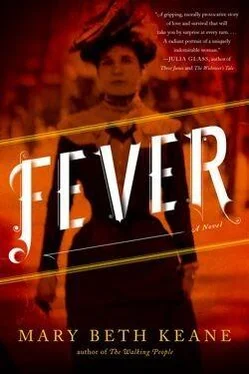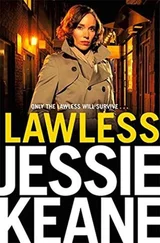When 1912 came Mary remembered that Alfred would have a birthday that year, having only one in every four, and calculated how many birthdays he’d had so far, and how it always seemed to soothe him, seeing February 29 on the newspaper, as if it proved that the date really did exist, and so did he. On the day after Alfred’s birthday Mary heard it said that a man had jumped from a moving airplane with the help of an enormous silk cloth that unfurled from a backpack as he floated all the way to the ground, unharmed, and it struck her that Alfred would be interested in that. It’s the kind of thing that would have kept him home for an evening, to talk about that with Mary, how man was getting more and more clever every year.
There was no use thinking of Alfred anymore, or expecting him to appear, or feeling as if he was watching her sometimes, or thinking of things she would say to him if she ever saw him again. She’d known him more than twenty years, and late at night, when she was tucked into her cot in the Borriellos’ kitchen, the boys snoring in the room beside her, the vent rattling behind the stove, the voices of other tenants traveling up the airshaft so that she could hear their conversations as plainly as if they were sitting at the foot of her bed, she quizzed herself: do you really think Alfred is gone for good? It had been fifteen months since she’d seen or heard from him. “Yes,” she whispered to those who might hear her along the airshaft, and pulled the blankets up around her shoulders. But shrouded inside her mind, hidden so well sometimes she feared she’d never find it again, was a single flame that she cupped with her hand, and blew into, and added twig after twig to. He’ll be back, she thought, and like every night when she had trouble sleeping, once she admitted what she knew was true, her head sunk deeper into the pillow, and she finally fell asleep.
In April, the Titanic reached Queenstown, and Mary thought of what a beautiful journey that would have been compared to her own crossing. Only five days later she’d not gotten twenty feet from her building when a newsboy shouted at her, “J. J. Astor is lost on the Titanic ! As many as eighteen hundred dead!” He waved the New-York Daily Courant in her face, and she fished out coins to purchase it. People were huddled around, sharing their copies and reading bits aloud.
“And Mrs. Astor?” a woman called.
“Alive!” The boy shouted. “She’s being brought on the Carpathia !”
All of New York stayed on the subject for the whole month of April. Mila said she couldn’t sleep for thinking of it, all those drowned people in the icy waters, so far from home. When the Carpathia arrived it was swarmed with those who wanted to get a look at the survivors, most of all Mrs. Astor, who stopped to let a holy man bless her pregnant belly. And when the Mackay-Bennett got to Halifax with three hundred of the bodies, Mary wondered why the survivors came to New York, but the dead did not, and what a gruesome job for the men at the docks that day.
In May 1912, one whole year after Mary started at the bakery, Jacob pushed open the swinging door that led to the kitchen and told her to come up front, there was a man there who wanted to see her.
“A man?” she asked. “For me?”
Mary’s hands shook as she returned the sifter to its spot. Evelyn halted her beating of half a dozen eggs to glance at her. “Did he ask for the baker or ask for me by name?”
“Just come up front,” Jacob said, and Mary noticed that it was unusually quiet up front for that hour of the morning. Normally, Mary could hear the chatter of customers at the counter, making their selections, some standing there eating what they purchased straight from the paper bags, but that morning she heard nothing except the sound of waiting, and Jacob holding open the door as she went to the sink, washed her hands, dried them, unpinned her hair, and then pinned it again. If Alfred went to the building first they would have told him where to find her. The Borriello boys met her sometimes, walked home with her, and even Jacob had gotten used to seeing them there. Sometimes she sent day-olds with them at midday so they could eat them before she got home. When there were lots of day-olds she sent enough for Fran and Joan as well, and she knew that sometimes those stale pastries and cookies and slices of pie never made it to Thirty-Third Street. Sometimes those two rascals found a patch of sidewalk, set themselves up on the ground, and ate every last crumb.
She touched her fingertips to the counter and thought of him standing out there. She would know in an instant if he was off the wagon or on. She pictured him married to Liza Meaney and decided it was best to believe that he was when she pushed out the door to face him; that way she wouldn’t be disappointed.
But she didn’t see anyone until Jacob stepped aside and she saw a man who was not Alfred standing before the window, his hands clasped behind his back.
“Mary Mallon,” Dr. Soper said. He didn’t step forward. He didn’t extend his hand. “I’m just after telling your boss about your history, and he’s agreed that you are to be let go.”
Mary felt all her blood rush to her throat and a reverberation begin in her ears. She staggered, and placed one hand on the counter. His hair shone, his shoes shone, his cheeks were as smooth and bare as a baby’s bottom, and his mustache was trimmed to perfection, every single little hair. He was as she remembered him, a wax figure, a nose that could stick a pig, a pale, ineffectual weakling of a man who preyed on healthy, strong women.
“He’s told you lies,” Mary said to Jacob, her voice a choked whisper, and then noticed the counter, where the newspaper articles about her case were lined up and labeled.
“I can’t risk it, Mary,” Jacob said.
“Have you had any complaints?” she demanded. “Has anyone come back to say they were made sick from what they ate here?”
“I’ve already told him that they haven’t, but he said that doesn’t matter. If they got the fever they might not realize where they got it. We wouldn’t know.”
Mary picked up a plate of lemon squares and flung them across the room at Soper. Soper stepped neatly to the side, then reached over and locked the entrance door.
“What did I tell you?” he said to Jacob.
“Please, Mary,” Jacob said. “He says we can’t sell anything until you’re gone and the kitchen scrubbed. I’m losing money every minute. If the DOH puts a notice in my window I’m done for, do you understand?”
“Miss Mallon. Please gather your things and come with me.” Soper said. “I’m bringing you directly to Commissioner Lederle’s office.”
Evelyn slipped through the swinging door and put her hand on Mary’s shoulder.
“You’re making a mistake,” Evelyn said to the men. Mary felt herself sway, and Evelyn braced her harder. She let Evelyn guide her to the back room.
“It’ll be fine. You’ll get something else,” Evelyn assured her as she stuffed the largest box with pastries.
“You don’t understand,” Mary said as Evelyn dropped loaves of fresh bread into the canvas satchel Mary took back and forth every day. He’d come with news clippings, and yet no police. He’d found her by chance. He carried the clippings around in his pocket. Maybe he’d followed her. Maybe the DOH had let him see her file and he’d gone looking for that address, one digit off, a building that didn’t exist. He’d suspected, but wasn’t sure, so he sussed out the situation himself. If he’d been sure, he would have brought police. Right now, she figured, he was strongly regretting not thinking out a better plan.
“Go now, this way, so you won’t have to face him,” Evelyn counseled. “I’ll stall him.”
Читать дальше












